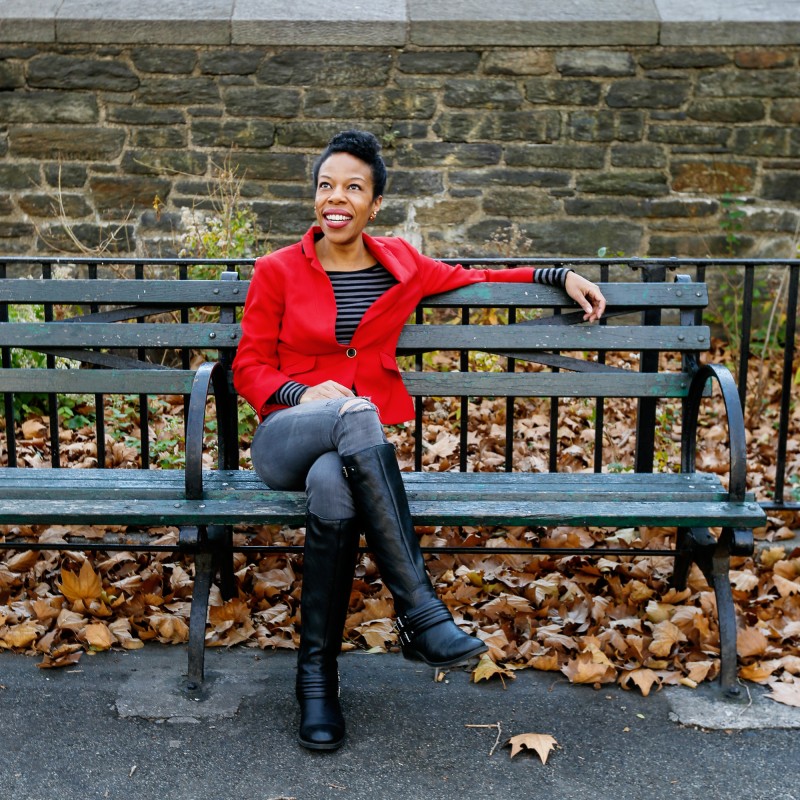An Interview with Nilaja Sun
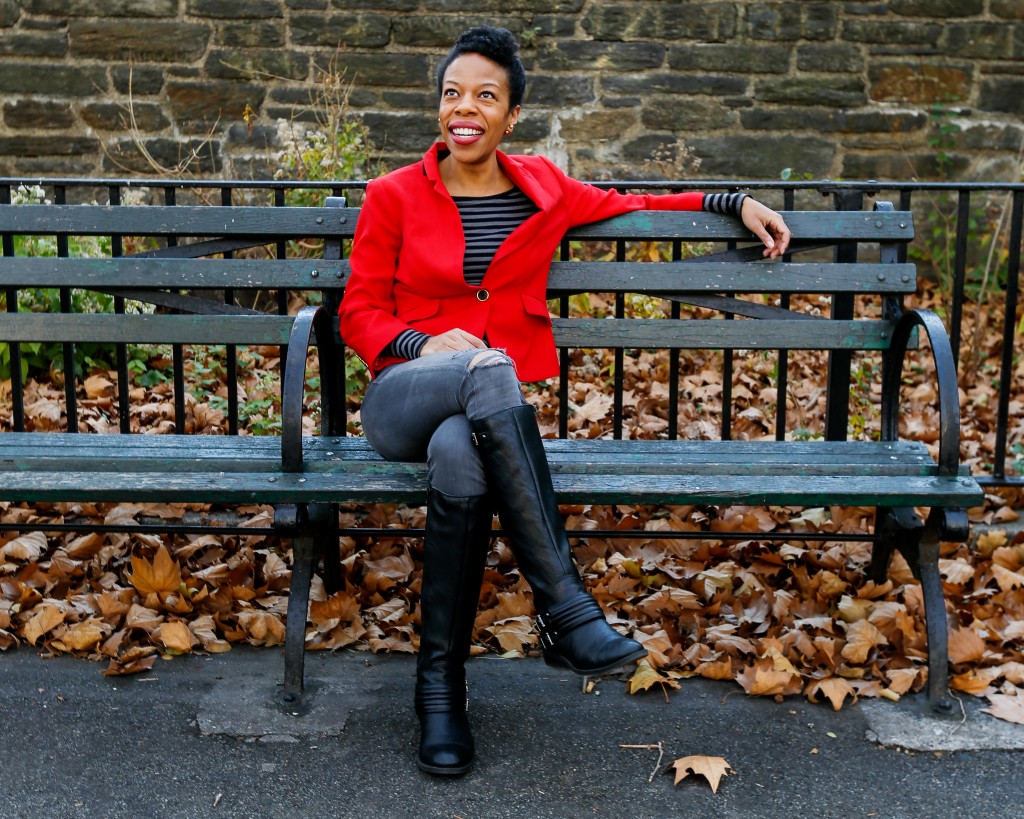
Written by Victoria Myers
Photography by Emma Pratte
December 1st, 2015
Before our interview with solo performer Nilaja Sun, we wandered into a playground by Fort Tryon Park to take some photos and stumbled onto a small children’s theatre. Nilaja immediately and joyfully climbed in and started goofing around and posing for the camera, punctuated by lots of, “this is so great!” That spirit lasted throughout our interview with her, where she treated us to some impressions, wry observations, and many insights into the world of solo performance. Nilaja is currently performing Pike St., about a family on the Lower East Side preparing for a hurricane, at the Abrons Art Center. Her solo piece No Child played for over a year in New York City, toured nationally and internationally, and won her about every award for solo performance there is (she earned 21 awards for No Child). On her day off from performing Pike St., Nilaja took the time to speak with us… and to find theatre everywhere.
(i.) Present
Could you tell us a little about how you developed Pike St.? I read that you were interested in the response to Hurricane Sandy. Did you start by interviewing people? Research?
It’s really based on kind of wanting to go back home to the Lower East Side after having seen what happened down there, and that during Sandy, folks were kind of left in darkness. I wanted to write a piece that highlighted that part of the Lower East Side by Chinatown. What it originally started as, is I was watching a TV show about energy healing, and this particular episode was about a young woman named Candice Anderson from Atlanta, Georgia, and she was a star student, and during the course of her senior year she developed this disease that left her unable to speak, eat, or breath on her own. So the episode was about her in her chair, her mother and father who no longer had a life because they were taking care of her, and also about energy healing. They brought in a woman who did some energy work on Candice and she went from looking very scared and frightened to giggling in one hour after this energy healer worked on her. So that was the original impetus for the show. Then, a month later, Hurricane Sandy happened and I started to think about all of the folks who were disabled or elderly and couldn’t leave their homes and stuck on the Lower East Side with no one to help them out. I really wanted to highlight a family that was trying to do it all on their own without going to a shelter and without any kind of outside aide. So that was the original impulse. Then with Hurricane Sandy, I had to do research on what happened and what didn’t happen in the response on the Lower East Side, as well as what some folks may have done to protect themselves that may have not been the smartest idea—like getting gas generators, which isn’t the smartest idea. People have to learn it’s something you shouldn’t do, but what are you going to do if you have a child who is in a chair and you’re not going to go to the shelter like you did the last time there was a storm? So I was really thinking about folks who were really attached to their home and what their lives might be like during a storm.
(ii.) Structure
One of the things I found interesting about Pike St. was that it’s really not docu-theatre, which is what I think a lot of people think of when they think solo performance.
Yeah, that’s not me. I don’t do that. My pieces come from people and feelings and life rather than research. During my life, I’m listening and feeling, and I’m also calibrating the emotions in the room and asking people about their lives, and from there I go into creating. I wouldn’t be able to do research and then create a piece. It would be so flat. It would be filled with ideas and not emotion. Mine is more of an emotional based work.
That seems different than the way they talk about solo performance in theatre survey classes—or at least in the one I had in college.
I went to college a little earlier than you and it was Spaulding Gray who was taught, and he wasn’t doing docu-theatre, so [it’s] just in ten or twenty years that we have [come to think of it that way]. And some people do call my work docu-theatre, and I think it’s just because they never ask me so they just assume. And my last piece [No Child ], since it was about the schools, people think I walked into the schools and researched students. It was the opposite. I’d been working in schools and then thought I’d do a piece on it. So it has to do with my life. It’s another thing entirely. Maybe I’ll come up with a name for it one day.
Pike St. is very much structured like a play. It’s not monologue based.
And that’s what No Child was, as well. If you look at it, it’s written as a play.
(iii.) Process
What is your writing process like?
It all comes from feeling. I don’t consider myself a playwright since I know actual playwrights wake up in the morning and think about writing, and I think about characters and performing the pieces. I would say that my plays come from this initial inspiration—like seeing Candice and feeling the feelings of Candice and feeling what it would be like to be the mother and waiting for her child to wake up from their paralyzed state—and from there I create. I do write at a desk, but I don’t sit and think, “What am I going to write now?” A lot of it is mirror work. And a lot of my ideas come from being on my feet performing.
I was curious about how much, in the writing process, it was already a play on its feet and how much you are always thinking about how everything is going to live physically?
I always think about how it’s going to live physically. There are times I have to remind myself, “Let the director figure out what it’s going to look like,” because I’m always thinking about what it’s going to look like physically and how I’m going to do it. And how I can go from one character to another, I do think about that a lot. So when I’m writing, you’re not going to see fifty people walk into a room, since I can’t do that. I do think about the physical much earlier than other playwrights might.
What is your acting process like when you’re playing so many different characters?
A lot of it takes a lot of rehearsal. I start out looking like a bumbling fool. Because I have already thought about it as a writer, I’ve already, in a way, written in a formula for myself to work through it as an actor. It’s not like I’m first getting the piece on the first day of rehearsal. When it comes to actors in TV or theatre, sometimes you’re the last to be able to work on the piece and you, as an actor, have to find some sort of magic. Whereas with this, I’ve already been thinking about it. And I also love physical theatre. That’s my passion. I think what happens is maybe that’s where folks get it wrong with me, which might have to do with my color and sex. Since I’m a black woman, they assume I’m coming from documentary theatre, but my background is physical theatre. That’s why I loved doing that photo in that little theatre [in the playground]—that’s where I’m coming from. So anything I can do as an actor in rehearsal that gets me more into my body, that’s what I’m doing.
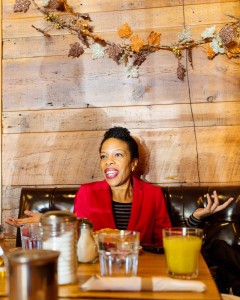
(iv.) Roles
You get to do things on stage that women usually don’t get to do.
But they can do it. Women can do it. This is my sixth solo piece and all I’ve done is written pieces and said, “I want to do this,” and I’m lucky enough to have gotten grants and people who have believed in me, but you don’t have to wait for anyone. You’ve got to love doing solo work. You can’t do solo work to get an agent or get casting directors to see you. You will die on stage. You have to really want to be able to perform the piece eight times a week. And even if there’s one person in the audience, at least there’s one person there listening and feeling and absorbing your characters. You have to really love the work you’re doing. And the magic will come with it.
When you were starting out, did you have any internal resistance in terms of doing what you needed to do to get the characters right?
No. Only because I come from a physical theatre background. I’m not saying I’ve had no blockages, but I love doing physical stuff. But where I have had it is at the first preview, right before I get on, of any solo piece I’ve ever done, I always think to myself, “Who the hell do I think I am?” I always think, “Who do I think I am to be doing a piece on my own?” Then I heard that Whoopi Goldberg feels that way. And Meryl Streep feels that way. But any kind of blockage, I really try and throw myself into that pool and even if there’s no water, I’m going to die bloody but at least with courage.
(v.) Themes
I was curious about how you felt the solo nature of solo performance affected the theatrical metaphor of the piece and what you’re saying?
From doing No Child and now with Pike St., I think the biggest metaphor is that we are somehow all connected, and if that means we’re all connected in one body you see on stage, our actions affect those around us and we are closer to one another than we might think. I feel that we’re all one somehow, and our actions affect our friends and family and the guy at the corner store and our neighbors. And because I am just throwing myself into it physically there is a feeling, from what I hear from my director, a feeling of courage to just get out there and do this piece. So I hope the audience will feel the courage in the characters and in their choices, and their choices to be courageous or not courageous in that moment, as a solo performer, is courageously throwing herself every which way on stage.
Do you see any themes in you work?
New York. Invisible New Yorkers. Folks that aren’t talked about in the theatre as much. Love. Instead of love it’s more like service. Service to one another. Death always seems to follow every show I do. It’s really life and death. And there’s always an “I” character. Even though the character of the mother [in Pike St.], Evelyn, though she’s not Nilaja, I feel like I’m Evelyn. There’s always an “I” character, so I never perform a bunch of characters and not have myself in there. There’s always a character who threads through the show.
Can you speak more about that? I was curious about if you thought of it like, “This is a story I’m putting forward and I’m disappearing,” or, “This is the story and here is the view of the writer”?
There’s very little neutrality in my shows. That’s why it’s very feeling. Most of my pieces are very feeling. And that is why there’s that “I” character, since I do want to make sure my perspective is onstage and that there is a center in my work that the characters revolves around. That’s why I don’t say I’m a playwright. Playwrights are able to have conversations like this, whereas as an actor I’m so in it, and I actively don’t think about the bigger [picture] since I want to just be in the moment of each character. In five years my answer might be different.
It’s interesting how the language we have to describe what you do is fairly limited since it’s based on a much more traditional model.
Yeah, it’s true. But that’s not the end of the world for me. It just means the work is unique.
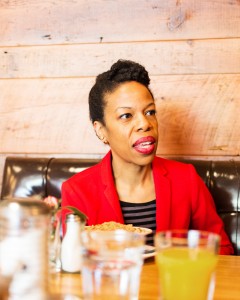
(vi.) Past
How did you get interested in solo performance?
I did something called the LaMaMa Performing Arts Program. I was a senior in college, and I came back to New York and did this program, and I learned from a great deal of wonderful teachers—one of them being a woman named Lenora Champagne, who is a well known downtown solo performer. So we had a solo performance class and I thought, “Oh, that’s interesting. That type of work is possible.” Then I went back to the school that I was going to, which was a predominately white school, and I had all of these black and Latino characters in a play I was writing in a playwriting class my last semester and no one to do the play. So that’s what started my solo performance journey, since literally no one else was around to do my work. That’s why I say you just have to do this work if you really have to rather than just to be seen. It’s too hard to do if you don’t really love it.
What is the first piece of storytelling that had a major impact on you?
The Syringa Tree. It was a solo piece done by a South African woman named Pamela Gien. I saw this piece [during] my senior year, at the 92nd Street Y. It was this South African white woman who was doing a piece about her life living in apartheid-era South Africa, and also having a nanny who was like her mother, and her nanny’s daughter. She played all of the characters. At first when I heard she was going to do to this I was like, “Good luck. You’re going to play all of these black South Africans? Good luck lady.” It was so beautiful. And it was a real play. And that’s what made me say, “Oh, I don’t have to just bang out monologues. I can do a real play. I can fuse into the characters like I’m invisible.” She’s one of my inspirations.
Who were your heroes growing up?
My folks. Oprah. I find heroes every day. Eddie Murphy. Carol Burnett. Janet Jackson for her physical stuff.
What was the first moment you felt like a grown up?
I do not feel like a grown up. Artists, we’re not supposed to be grown ups. Just like you said about theatre and solo work and how there’s no language for it, it’s the same with grown ups. Grown up means I’m the opposite of something else. It means youth and young and child, and we can’t be the opposite of that or we couldn’t find the souls of our characters. And I know people in my family and friends who are grown ups, and they’ve left that aside and maybe they go back to it on Saturdays, but we can’t possibly… we have to fuse the grown up with the child. There are times, in this business, when I feel grown. Like when someone will pick me up in a car or get me a first class ticket on a plane, but then I get off the plane and I’m like whackadoodle.
(vii.) Engagement
Do you ever worry in solo performance how it will be affected by other things going on politically or political correctness?
Yes. I don’t think about political correctness as much since I’m like, “Look I wrote this play.” After Paris happened and my character is a Navy SEAL who walks into a bodega and is bullying a Middle Eastern man, I’m like, “Wow this is so interesting,” and I wonder how many people are saying, “Yeah, get him!” to the character in their minds, “Yeah, get him. We’re tired of this.” It does make me think. But I don’t change my work.
Do you ever find, as you’re doing the show, that something happens in your life that affects the way you view the work, and because you’re the writer do you ever think, “I should change that”?
I try to honor the writer who wrote the piece. If I start changing one thing I’m going to change other things. So I try to honor that writer. But that’s one of the reasons that I do take time. Like I took time between No Child and Pike St. Some people were like, “When is your next piece?” and I have to live a life first in order to create a piece about life. So I do take my time and live before I write my piece. Emotionally and internally things change.
One thing that’s become a bit of a theme in these interviews is theatre as social engagement, and this weird catch-22 with theatre, where on the one hand theatre is live and immediate, but on the other it usually takes years for a piece to actually make it to an audience. What are your thoughts on that?
That’s why I wouldn’t do a piece on Hurricane Sandy. It’s about another hurricane that might happen. Because I knew when I wrote it I knew that in two years people were going to be done. But if you think about it, there’s always going to be another hurricane. All of these issues… I don’t know one issue that just stops. And some people aren’t on the same wavelength with the media. So if they see what you’re doing in the theatre two years from now, they might go, “Oh, I never thought about that.”
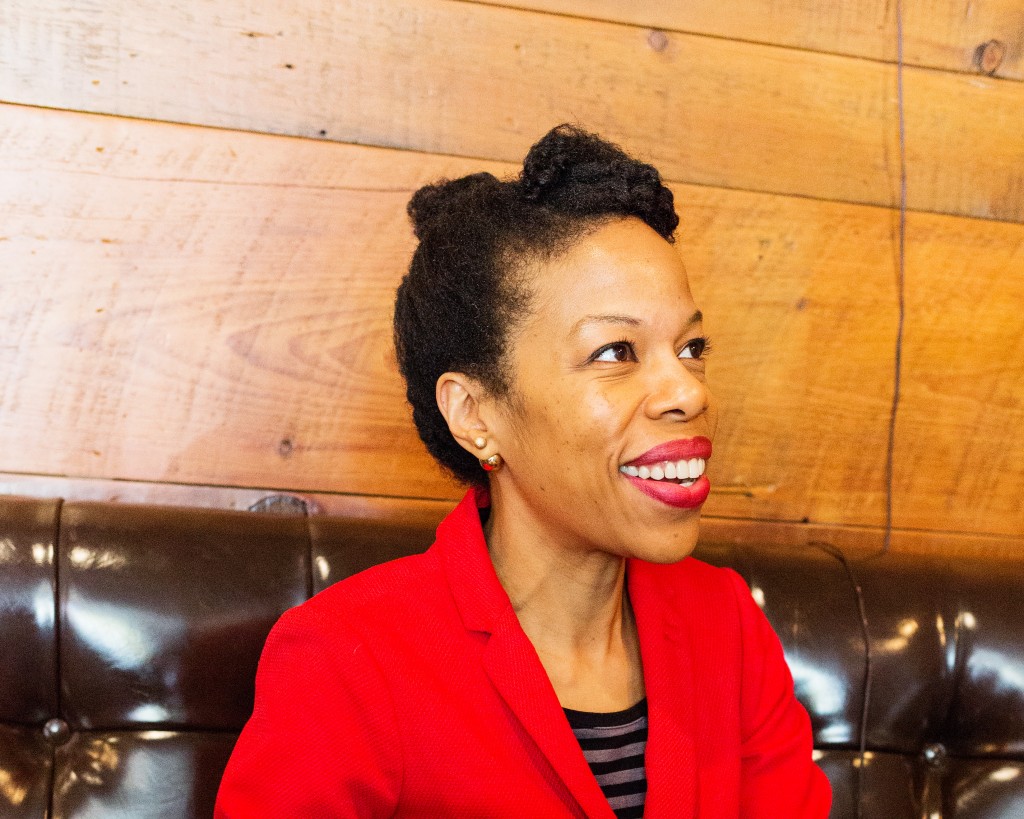
(viii.) Development
I read that you did a few workshops of this piece. Do you find there are differences in doing a workshop of a solo piece than of a play?
Yes, you’re really on. Even in a reading. You’re not really trying things out in a reading of a solo piece. That’s why I could only do a few readings, since I’m basically just doing the piece. And I don’t like to try things out in front of an audience and fumble. I mean, I like to try things out, but not to a place where it looks messy. In a way you’re controlling the workshop a lot more than you would in an average reading. And you can control it since you’re the actor as well.
(ix.) Boundaries
Something that comes up a lot in interviews is the issue of parity, and that plays by men are more likely to get produced than plays by women. I’ve never heard solo performance come up in that.
You’re in uncharted territory here. I’m trying to think… I’m thinking of Danny Hoch. John Leguizamo.
I can think of a number of female solo performers too.
Yeah, I can think of many more female solo performers. Folks have said to me, and I always roll my eyes, they go, “Oh, it’s so much cheaper to produce you than a play.” But that’s a question for a producer. And I don’t think like a playwright. Playwrights might look at the list of who’s getting produced and think, “Why aren’t I getting produced?” but I don’t really think like that because I’m always doing the show somewhere. But that’s the only thing I can think of: when people say solo performers are cheaper, which, yes, is true, but it makes me sound like a cheap prostitute.
Something that comes up a fair amount is how men and women are talked about differently. And certain societal pressures that are placed on women to be nice and easygoing.
You must say what you want. Don’t be afraid of telling people what you want and having boundaries. I know people say, “Oh, but I want to be open,” but have boundaries. People will appreciate you and respect you more if you have boundaries.
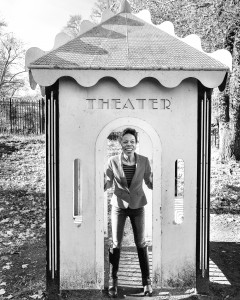
(x.) Future
What’s something you think people can do to improve gender parity in theatre?
Just freaking throw your body into that pool and know there is water. I feel there’s a privilege I have—I don’t have that same privilege on TV being a black actress on TV and getting roles—but I don’t feel my gender when I’m creating my own work. Here’s the interesting thing that I always think about whenever I have the first reading of the play with the designers and director—I look at everyone and they’re usually all white men. If you were to put us all in the same nursery at New York Hospital where I was born, imagine all of these babies lined up at New York Hospital, now which one do you think everyone is going to be all rallied around creating something? I’m sure you’re not going to think it’s the black girl. I feel very thankful. So I’d say there is a privilege in creating your own work. Please create your own work. Folks tell me, “Well, no one is writing…” and I say, “Can you write for an eight-year-old Chinese kid?” and they go, “Well…” No, you can’t. Unless you have an eight-year-old Chinese kid, you can’t. So just don’t expect a man in his 60s to write for you—and if they do it’s not going to be from a place of knowing, it will be because they had to. So now they’re writing angrily. So if you have the talent, write and create. Create new ways of talking about solo work. Everyone is going to go, “That’s very privileged of you, Nilaja.” But there is so much more power in creating. When I go to auditions, I try to be writing my own work somehow. When everyone is waiting, I just feel so much better when I’m writing my own work. I’m like, “At least I have something else.” Don’t wait by the phone, ladies, always have something else to do. Don’t wait by the phone for him to call.
You can follow Nilaja on Twitter: @TheNilajaSun.

